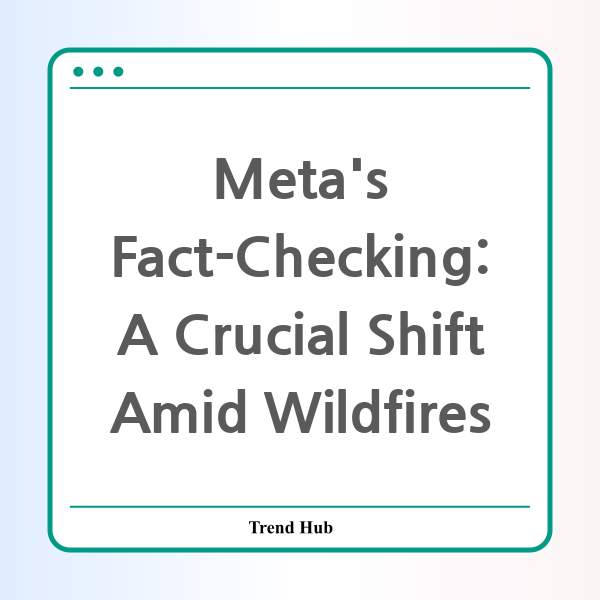* This website participates in the Amazon Affiliate Program and earns from qualifying purchases.

Facing a Flood of Misinformation: What Happens When Fact-Checkers Are Eliminated?
As wildfires rage through California, the announcement from Meta, the parent company of Facebook, regarding the removal of its US-based fact-checking team comes at a critical moment. How will the absence of professional fact-checkers impact the spread of misinformation during disasters? This question looms large as conspiracy theories begin to spiral out of control on social media platforms.
In recent days, misinformation regarding the wildfires has exploded online. Following the fires, rumors and wild conspiracy theories emerged almost instantaneously, reminiscent of the fears and false claims seen during similar disasters in the past. With Meta's decision to eliminate fact-checkers, the risks associated with unchecked misinformation are severe.
One of the most alarming aspects of this scenario is the speed at which misinformation spreads. With Meta's professional fact-checkers on the verge of losing their jobs, the rumor mill has been churning out narratives that undermine public trust in emergency services. Posts claiming the fires are a politically charged event or accusing the government of deliberate action have begun to gain traction. This sensationalism can lead to real-world consequences, such as panic and distrust among communities that need accurate information the most.
The recent fires have already prompted a series of false narratives online, including claims that the wildfires were intended to serve a political agenda. For example, various social media posts have incorrectly linked looting to these natural disasters, which misrepresents the efforts of families simply seeking to salvage their belongings. This kind of misinformation not only distorts the truth but also creates a hostile environment during a crisis.
A prominent example of misinformation involved a viral video that falsely depicted an image of the iconic Hollywood sign engulfed in flames, which was, in truth, fabricated. Claims made about police efforts involving MAGA individuals linked to the fires have also led to widespread panic and confusion. Each false claim breeds further speculation, creating a vortex of chaos that can severely hinder emergency response efforts.
What makes the current situation even more treacherous is the involvement of influential public figures, who have also used their platforms to amplify these baseless claims. Prominent personalities have made statements that link the fires directly to political controversies, further embedding the lies into the public consciousness. The impact of such figures on social media cannot be underestimated, as their followers are quick to share content without verifying its authenticity.
Moving forward, the proposed replacement for professional fact-checkers—community-driven initiatives—has sparked debate. While crowd-sourced fact-checking has seen some success, it lacks the rigor and accountability of professional journalists dedicated to the truth. Community notes can serve as a supplementary measure but are not equipped to address the vast array of complex conspiracy theories that arise during moments of crisis.
Ultimately, the challenge of combating misinformation is intensified by the loss of professional oversight in fact-checking. As Meta moves towards a community-based model, the question remains: can social media platforms adequately protect the public from falsehoods? Only time will tell if this transition leads to heightened misinformation or if it empowers communities to engage responsibly with content.
As stakeholders in the digital space, it's vital that we remain vigilant. We must encourage transparency, promote factual accuracy, and support initiatives that protect against the harmful effects of misinformation — especially during critical times like disaster recovery.
* This website participates in the Amazon Affiliate Program and earns from qualifying purchases.